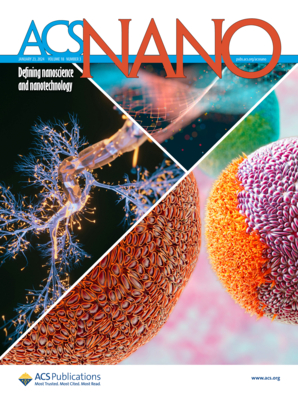通过特异性癌症相关成纤维细胞亚型工程原位重塑肿瘤微环境以增强抗肿瘤免疫。
IF 16
1区 材料科学
Q1 CHEMISTRY, MULTIDISCIPLINARY
引用次数: 0
摘要
癌症相关成纤维细胞(CAFs)是异质的,是肿瘤进展的关键驱动因素,然而原位工程促进肿瘤的CAF亚型提供了一个尚未开发的治疗机会。在此,我们验证了4T1小鼠模型中的FAP+αSMA+ CAFs亚型有效地概括了其在人类三阴性乳腺癌(TNBC)中的对应亚型,显示出强大的肿瘤促进活性。我们使用一种创新的纳米药物,IL-15质粒负载fap敏感的MgCa/z- ggy - pro -帕米膦酸纳米颗粒(PN/MCG NPs),在原位设计这些CAFs以增强抗肿瘤免疫。PN/MCG NPs可以逆转FAP+ αSMA+ CAFs的促瘤表型,并使FAP+ αSMA+ CAFs维持IL-15的表达。这些工程FAP+ αSMA+ CAFs显著降低肿瘤免疫抑制。基因集富集分析(GSEA)显示免疫细胞增殖和活化增强。此外,我们还证明了FAP+ αSMA+人乳腺成纤维细胞(FAP+ αSMA+ HMFs)也可以通过PN/MCG NPs在体外培养。我们的研究结果表明,原位CAF工程是一种很有前途的策略,可以重塑肿瘤微环境并增强TNBC的免疫治疗。本文章由计算机程序翻译,如有差异,请以英文原文为准。
In Situ Remodeling of Tumor Microenvironment via Specific Cancer-Associated Fibroblasts Subtype Engineering to Boost Antitumor Immunity.
Cancer-associated fibroblasts (CAFs) are heterogeneous and critical drivers of tumor progression, yet engineering tumor-promoting CAF subtypes in situ offers an untapped therapeutic opportunity. Herein, we verify that the FAP+αSMA+ CAFs subtype in the 4T1 murine model effectively recapitulates its counterpart in human triple-negative breast cancer (TNBC), demonstrating strong tumor-promoting activity. We specifically engineer these CAFs in situ to enhance antitumor immunity using an innovative nanodrug, IL-15 plasmid-loaded FAP-sensitive MgCa/z-Gly-Pro-pamidronate acid nanoparticles (PN/MCG NPs). PN/MCG NPs can reverse the tumor-promoting phenotype of FAP+ αSMA+ CAFs and engineer FAP+ αSMA+ CAFs to sustain IL-15 expression. These engineered FAP+ αSMA+ CAFs significantly reduce the tumor immune suppression. Gene set enrichment analysis (GSEA) reveals enhanced immune cell proliferation and activation. Furthermore, we also prove that FAP+ αSMA+ human mammary fibroblast cells (FAP+ αSMA+ HMFs) also can be engineered by PN/MCG NPs in vitro. Our findings demonstrate that in situ CAF engineering is a promising strategy to remodel the tumor microenvironment and enhance immunotherapy in TNBC.
求助全文
通过发布文献求助,成功后即可免费获取论文全文。
去求助
来源期刊

ACS Nano
工程技术-材料科学:综合
CiteScore
26.00
自引率
4.10%
发文量
1627
审稿时长
1.7 months
期刊介绍:
ACS Nano, published monthly, serves as an international forum for comprehensive articles on nanoscience and nanotechnology research at the intersections of chemistry, biology, materials science, physics, and engineering. The journal fosters communication among scientists in these communities, facilitating collaboration, new research opportunities, and advancements through discoveries. ACS Nano covers synthesis, assembly, characterization, theory, and simulation of nanostructures, nanobiotechnology, nanofabrication, methods and tools for nanoscience and nanotechnology, and self- and directed-assembly. Alongside original research articles, it offers thorough reviews, perspectives on cutting-edge research, and discussions envisioning the future of nanoscience and nanotechnology.
 求助内容:
求助内容: 应助结果提醒方式:
应助结果提醒方式:


